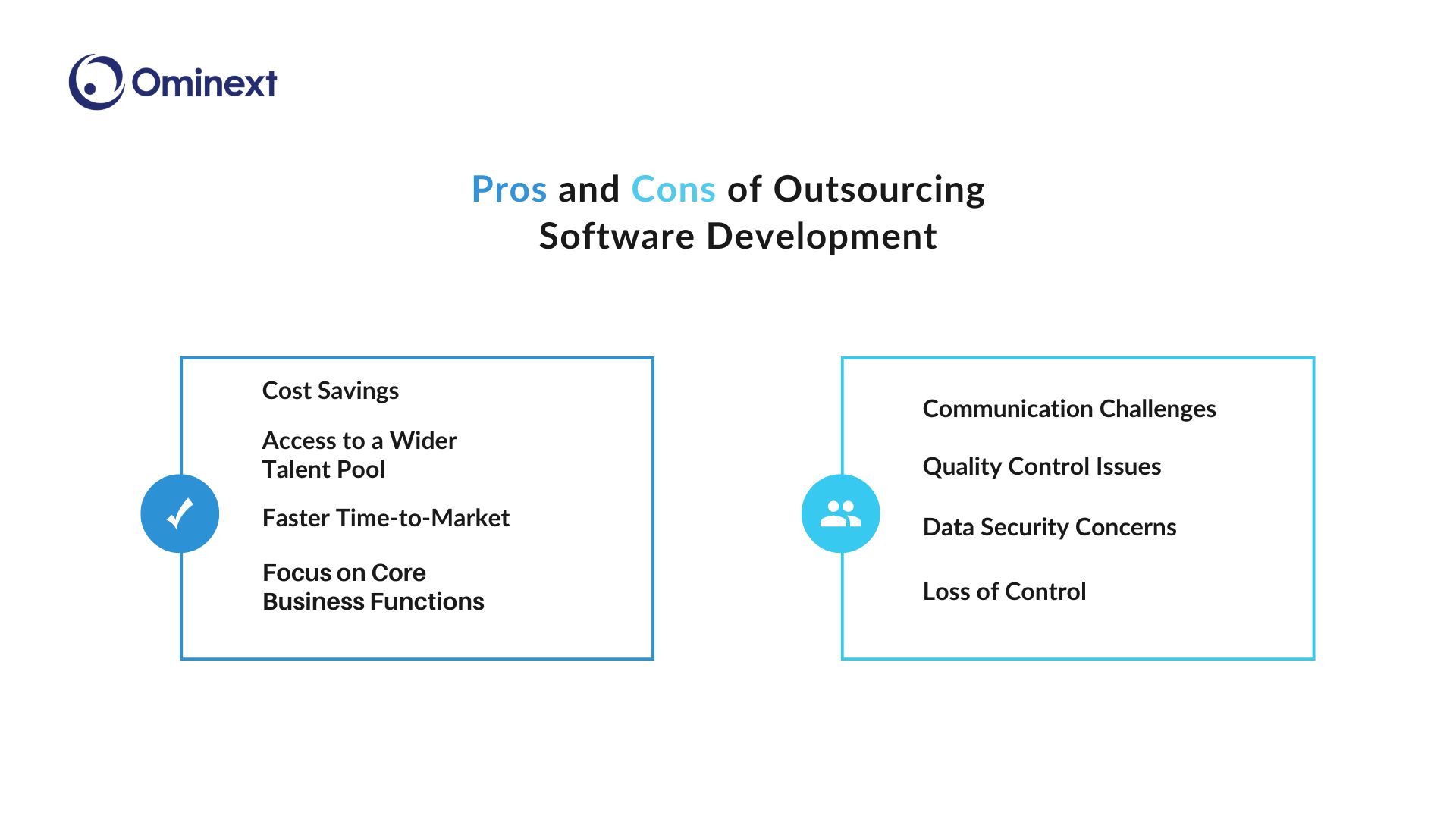Understand The Pros and Cons of Outsourcing Software Development
Outsourcing software development has become an increasingly popular strategy for businesses. In fact, according to a recent survey by Statista, IT outsourcing revenue is expected to show an annual growth rate (CAGR 2023-2027) of 12.42%, resulting in a market volume of US$12.47bn by 2027. This growing trend mainly comes from the huge benefits outsourcing services bring back.
However, outsourcing also has challenges and potential drawbacks that companies should consider before implementing. In this blog, we will explore the pros and cons of outsourcing software development, providing insights to help you decide whether this approach is right for your organization.
What is Outsourcing Software Development?
Outsourcing software development is the process of hiring external organizations or freelance professionals to handle various stages of the software development lifecycle. This can include activities such as requirement analysis, design, coding, testing, deployment, and maintenance of software applications.

The Pros of Software Development Outsourcing
1. Cost Saving
First of all, it can be said that outsourcing software development can significantly reduce your project's cost. When outsourcing, you can find highly experienced developers with lower salaries compared to local hiring. You also don't have to cover other costs such as employee benefits, office space, and IT infrastructure which are typically associated with an in-house team.
According to Join Genius, compared to hiring in-house, outsourcing IT can lead to savings of up to 85%.
Plus, outsourcing allows you to scale your development team based on project needs, ensuring you only pay for the resources you use. Thus, flexibility makes outsourcing a cost-effective solution for businesses of all sizes.
2. Access to a Wider Talent Pool
When you outsource software development means that you're not limited to the talent pool in your country. Now you have access to a wider range of skilled developers from all over the world. This attracts specialists in specific programming languages, niche technologies, or even those with experience in your target industry. The global talent pool not only brings fresh perspectives but also expertise to your project, potentially giving you a competitive edge, and ensuring a successful project.
3. Faster Time-to-Market
Outsourcing software development can propel companies ahead of the competition by accelerating the time-to-market. Once you decide to outsource the project, you can skip the whole process of recruiting, onboarding, and training an in-house team. Instead, you leverage established development teams ready to dive right in.
Besides, outsourcing partners often have proven workflows, which reduces the need to build these processes from scratch. In some cases, the time zone difference with your outsourcing partner can even create a near-continuous development cycle, further speeding up the project's completion.
4. Focus on Core Business Functions
By outsourcing software development, businesses can free up the internal team to focus on what they do best: driving the core business functions. Thanks to outsourcing, they’re free from the complexities of development, allowing them to dedicate their expertise to areas like marketing, sales, or customer service. This not only improves overall team efficiency but also allows internal developers to concentrate on tasks that require a deep understanding of the business or close collaboration with other internal teams.
The Cons
1. Communication Challenges
Outsourcing software development can be a double-edged sword when it comes to communication. While it offers a global talent pool, it also has potential communication challenges.

Clearly, language barriers can lead to misunderstandings about project requirements and functionality. Moreover, cultural differences in communication styles can cause delays or missed deadlines. Meanwhile, time zone gaps make real-time collaboration difficult and can disrupt feedback.
These hurdles can be overcome by choosing an outsourcing partner with strong language proficiency and cultural sensitivity. To ensure a smooth and successful project, some solutions can be applied such as:
1. Establishing clear communication protocols
2. Utilizing video conferencing tools
3. Setting expectations around response times
2. Quality Control Issues
The second potential downside of outsourcing software development is maintaining quality control. When working with a remote team, it can be difficult to ensure the product meets high standards. Differences in coding practices, a lack of familiarity with your specific requirements, or inadequate testing procedures can lead to bugs and functionality issues.
To mitigate this risk, implement clear coding standards, conduct regular code reviews, and establish a rigorous testing process with clear deliverables at each stage. This proactive approach can help ensure the quality of your outsourced software development project.
3. Data Security Concerns
Moreover, data security is also a concerning problem as you need to share sensitive information like customer data or proprietary code with a third-party vendor. This creates potential vulnerabilities. Data breaches or intellectual property theft can happen within the outsourcing partner's company because of lax security practices.
To protect your data, you should:
1. Carefully require potential partners for their security certifications.
2. Ensure iron-clad Non-Disclosure Agreements (NDAs) are in place.
3. Implement data encryption practices to minimize the risk of exposure.
4. Control & Management
When you outsource software development, you are limited in control over the project. This can be a concern for companies with highly specific requirements or those needing to make frequent changes in the development process.
However, this loss of control can be limited by establishing clear communication channels, setting up regular progress reports, and having a well-defined project management methodology in place.
How do we weigh these pros and cons?
Deciding whether to outsource software development depends on carefully weighing its pros and cons against your specific needs. To make a tight decision, businesses should prioritize their company's goals. If tight control over the development process isn't crucial, and access to specialized skills is a top need, outsourcing can be a good choice. However, if seamless communication is crucial, a geographically distant team might introduce challenges.
Ultimately, we should create a cost-benefit analysis that considers the potential savings, efficiency gains, and access to talent, while also acknowledging the risks of quality control, data security, and potential communication hurdles. By understanding your project requirements and your team's goals, you can make an informed decision about whether outsourcing is the right move for your software development project.
Conclusion
In conclusion, outsourcing software development can be a strategic decision that provides significant benefits. From cost savings and access to a wider talent pool to faster time-to-market and increased focus on core business goals, the advantages are undeniable.
However, it's significant to be aware of the potential drawbacks, such as communication challenges, quality control, security risks, and loss of control concerns. By carefully weighing the pros and cons, and by establishing a strong working relationship with an outsourcing partner, it’s believed that businesses can leverage outsourcing to achieve software development goals and gain a competitive edge.





